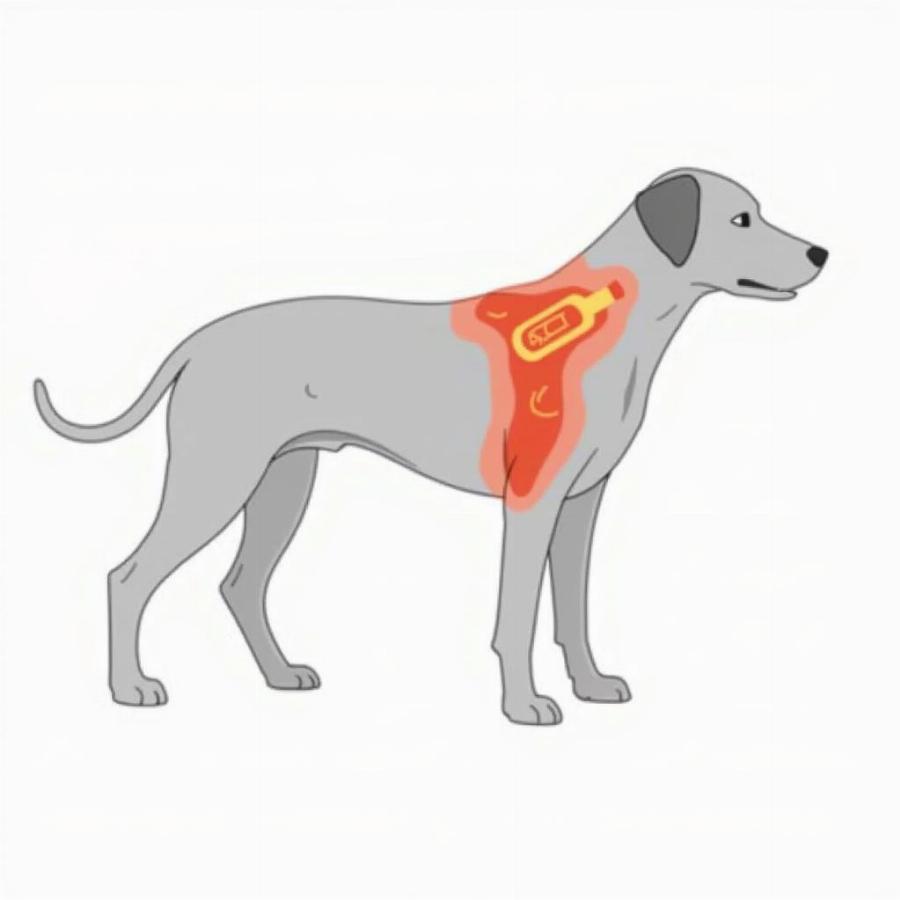Dog biting base of tail is a common behavior that can stem from various underlying issues, ranging from simple irritations to more serious medical conditions. Understanding why your dog is engaging in this behavior is crucial for addressing the root cause and providing effective relief. This article will delve into the common reasons behind tail biting in dogs, offer practical solutions, and guide you on when to seek professional veterinary help.
Why is My Dog Biting the Base of its Tail?
There are several reasons why a dog might bite the base of its tail. Identifying the specific cause is the first step towards finding a solution. Is it due to fleas, allergies, or something else entirely? Let’s explore some of the most common culprits:
Parasites: Fleas, Ticks, and Mites
Fleas are a frequent cause of itching and irritation, particularly at the base of the tail. Ticks and mites can also infest this area, leading to intense discomfort and prompting your dog to bite and chew.
Allergies: Environmental and Food-Related
Allergies can manifest in various ways, including skin irritation and itching. Environmental allergies, such as pollen or dust mites, and food allergies can both contribute to tail biting. Identifying the specific allergen is key to managing the allergy and relieving your dog’s discomfort.
Anal Gland Issues: Impaction and Infection
The anal glands, located near the base of the tail, can become impacted or infected, causing pain and irritation.  Chó cảnh bị viêm tuyến hậu môn This discomfort can lead to excessive licking, chewing, and biting at the base of the tail.
Chó cảnh bị viêm tuyến hậu môn This discomfort can lead to excessive licking, chewing, and biting at the base of the tail.
Skin Infections: Hot Spots and Other Irritations
Bacterial or fungal skin infections, often referred to as hot spots, can develop in the warm, moist area around the base of the tail. These infections can be extremely itchy and painful, causing dogs to bite and lick the affected area.
Behavioral Issues: Anxiety and Boredom
In some cases, tail biting can be a sign of anxiety, boredom, or stress. why does my dog bite his tail Dogs may engage in this behavior as a coping mechanism or simply as a way to release pent-up energy.
What to Do if Your Dog is Biting its Tail
Once you’ve identified the potential cause, you can take steps to address the issue. Here are some practical solutions:
-
Flea and Tick Control: Regularly treat your dog with a veterinarian-recommended flea and tick preventative. citronella spray for dogs This is crucial for preventing infestations and minimizing the associated itching and irritation.
-
Allergy Management: Work with your veterinarian to identify and manage any allergies. This may involve dietary changes, allergy testing, or medication. dog anti itch spray
-
Anal Gland Expression: If you suspect anal gland issues, consult your veterinarian. They can express the glands and provide appropriate treatment if necessary.
-
Veterinary Care for Infections: Skin infections require veterinary attention. Your veterinarian can diagnose the type of infection and prescribe appropriate medications, such as antibiotics or antifungals. aminocaproic acid for dogs
-
Behavioral Modification: For anxiety or boredom-related tail biting, consider increasing exercise, providing mental stimulation through puzzles and toys, and creating a calm and predictable environment.
When to Seek Veterinary Help
While some causes of tail biting can be managed at home, others require professional veterinary care. Consult your veterinarian if:
- The biting is persistent or severe.
- The area around the base of the tail is red, swollen, or has a foul odor.
- Your dog appears to be in pain.
- You suspect an underlying medical condition.
Conclusion
Dog biting base of tail can be a sign of various underlying issues. Addressing the root cause is essential for providing effective relief and ensuring your dog’s comfort and well-being. By observing your dog’s behavior, consulting with your veterinarian, and implementing the appropriate solutions, you can help your furry friend stop this bothersome habit.
FAQ:
- Can stress cause a dog to bite its tail? Yes, stress and anxiety can lead to compulsive behaviors like tail biting.
- How can I tell if my dog has fleas? Look for small, dark insects on your dog’s skin, especially around the base of the tail. You might also see “flea dirt,” which looks like black pepper.
- Are there home remedies for dog tail biting? While some home remedies may provide temporary relief, it’s essential to address the underlying cause. Always consult your veterinarian before trying any home remedies.
- What if my dog’s tail biting doesn’t stop? If the behavior persists despite treatment, consult your veterinarian for further evaluation.
- Can tail biting lead to more serious problems? Yes, if left untreated, tail biting can lead to skin infections, hair loss, and even self-mutilation. what do dog fleas look like to the human eye
Other Questions to Consider:
- Are there specific breeds more prone to tail biting?
- How can I prevent tail biting in my dog?
Beaut Dogs is your trusted source for all things related to dog care, providing comprehensive and reliable information to help you understand and care for your canine companion. For personalized guidance and expert advice, contact us at Email: [email protected]. We’re here to help you navigate the wonderful world of dog ownership. Beaut Dogs is committed to providing accurate and up-to-date information to help you keep your dog healthy and happy. Visit us at https://beautdogs.com.